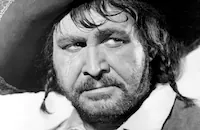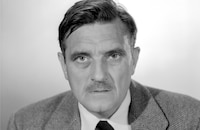Frontier Gun
Cast & Crew
Paul Landres
John Agar
Joyce Meadows
Robert Strauss
Barton Maclane
Lyn Thomas
Film Details
Technical Specs

Synopsis
In 1873, after Marshal Swain of Honcho, Texas is murdered, the town council contacts famous gunfighters, including Wild Bill Hickok, Bat Masterson and the Earp brothers, but all refuse to take the job as his replacement. Saloon owner Yubo, a half-breed whose henchmen killed Swain, plans to put his own man in as marshal. Yubo hopes to run the town completely in ten years, so that he will not be "just another half-breed." The town's leading citizens, however, want Honcho, formerly just a crossroads, to grow into a safe place for "decent" people to live. Jim Crayle, son of one of the famous gunfighters who refused to come, rides to town and applies for the job. After he impresses the council with his marksmanship, he is given the badge. In Yubo's saloon, Yubo's mistress, Kate Durand, humiliates Jim by first kissing him, and then taking his gun. Jim bests Yubo's henchmen, Vince and Tanner, in a fight as the townsfolk watch, and after warning Yubo that he will throw out of town the next man who jumps him, he dumps Kate into a horse trough. Hotel owner Andrew Barton, impressed with Jim, invites him to supper at his large house on the hill up the main street. At the house, Barton's haughty daughter Peg tries to humiliate Jim, and during the meal, Jim drops a soup bowl. He apologizes to Peg, saying he is just a saddle tramp who has never had a home. She kisses him, but he rebukes her and says she is acting like a dance hall girl and that kissing has to be done with feeling. Jim's father Simon rides into town and rebukes his son for not facing up to the fact that he has an injured wrist and cannot draw fast enough to be a marshal. Jim blames his father for the accident that left him injured and for the fact that the only thing he has ever wanted to be is a lawman. Their argument is interrupted by a fight that begins after a cowhand charges that the cards used in Yubo's saloon are marked. When Yubo threatens to draw on Jim if he looks at the cards, Jim shoves a table against Yubo to pin him to the wall. He finds that the deck is marked and gives Yubo until Monday morning to get out of town. Jim convenes a town council meeting and asks for twelve deputies, saying that Yubo will back down if they stand up to him, or take over the town if they don't. Jim succeeds in getting only three men, including Barton, to stand with him. Simon, suspecting that Peg is falling in love with Jim, tells her about the accident so she will intervene. Simon tells Jim that Peg cares for him and encourages him to listen to her. At the Barton house, Jim discourages Peg's younger brother Virgil when he says he wants to be his deputy by showing him up in a draw. Peg appreciates that, and when he says he will be nothing if he does not try to go against Yubo, she admits she loves him and cries. She tells him, though, that she does not want to change or weaken him, and they kiss. A shot through the window grazes Peg's shoulder. Jim then tricks Vince, who fired the shot, and shoots him. Jim next sets fire to a haystack where Tanner lies in wait, forcing him out, then kills him. Simon advises Jim to arrest Yubo and then ride him until he goes for his gun, so that Jim could shoot him. Jim refuses the advice, though. When Cash Skelton, a drunk Yubo keeps in the saloon for amusement, tries to talk Kate into leaving town with him, Yubo overhears and beats Cash savagely. Insulted by Yubo, Kate tells Simon Yubo's plan to take over by luring Jim out of town. Simon finds Yubo on the road outside of town, but Yubo kills him and takes his gunbelt. At the church, as the reverend remonstrates his congregation, saying they must stand behind Jim, Yubo yells from outside for Jim to come out. Calling the townspeople cowards, Peg says Jim should not get himself killed for them. Only Barton, Virgil and the reverend accompany Jim to meet Yubo and his men. After they leave the church, however, the townsfolk decide to back them up, but Jim tells them to stay back. Yubo throws Jim Simon's belt "as a going away present," and they have a showdown. Yubo shoots Jim in the shoulder, and Jim shoots a bullet into Yubo's forehead. Jim sends the gang off, and the townspeople take Jim into the church.

Director
Paul Landres
Cast

John Agar

Joyce Meadows

Robert Strauss

Barton Maclane
Lyn Thomas

James Griffith

Morris Ankrum
Leslie Bradley
Doodles Weaver
Mike Ragan
Tom Daly
Sammy Ogg
George Brand
Claire Dubrey

Daniel White
Dan Simmons
Sydney Mason
Crew
Victor Appel
Maury Dexter
Paul Dunlap
George Emick
Robert Fritch
Harry Gerstad
Clancy Herne
Stephen Kandel
Monroe Liebgold
Robert Littlefield
Richard E. Lyons
Lou Perlof
Harry Reif
Clark Ross
Edward Shiells
Lillian Shore
Walter Strenge
Billy Vernon

Film Details
Technical Specs

Articles
TCM Remembers - John Agar
Popular b-movie actor John Agar died April 7th at the age of 81. Agar is probably best known as the actor that married Shirley Temple in 1945 but he also appeared alongside John Wayne in several films. Agar soon became a fixture in such films as Tarantula (1955) and The Mole People (1956) and was a cult favorite ever since, something he took in good spirits and seemed to enjoy. In 1972, for instance, the fan magazine Famous Monsters of Filmland mistakenly ran his obituary, a piece that Agar would later happily autograph.
Agar was born January 31, 1921 in Chicago. He had been a sergeant in the Army Air Corps working as a physical trainer when he was hired in 1945 to escort 16-year-old Shirley Temple to a Hollywood party. Agar apparently knew Temple earlier since his sister was a classmate of Temple's. Despite the objections of Temple's mother the two became a couple and were married shortly after. Temple's producer David Selznick asked Agar if he wanted to act but he reportedly replied that one actor in the family was enough. Nevertheless, Selznick paid for acting lessons and signed Agar to a contract.
Agar's first film was the John Ford-directed Fort Apache (1948) also starring Temple. Agar and Temple also both appeared in Adventure in Baltimore (1949) and had a daughter in 1948 but were divorced the following year. Agar married again in 1951 which lasted until his wife's death in 2000. Agar worked in a string of Westerns and war films such as Sands of Iwo Jima (1949), Breakthrough (1950) and She Wore a Yellow Ribbon (1949). Later when pressed for money he began making the films that would establish his reputation beyond the gossip columns: Revenge of the Creature (1955), The Brain from Planet Arous (1957), Invisible Invaders (1959) and the mind-boggling Zontar, the Thing from Venus (1966). The roles became progressively smaller so Agar sold insurance and real estate on the side. When he appeared in the 1988 film Miracle Mile his dialogue supposedly included obscenities which Agar had always refused to use. He showed the director a way to do the scene without that language and that's how it was filmed.
By Lang Thompson
DUDLEY MOORE, 1935-2002
Award-winning actor, comedian and musician Dudley Moore died on March 27th at the age of 66. Moore first gained notice in his native England for ground-breaking stage and TV comedy before later building a Hollywood career. Like many of his peers, he had an amiable, open appeal that was balanced against a sharply satiric edge. Moore could play the confused innocent as well as the crafty schemer and tended to command attention wherever he appeared. Among his four marriages were two actresses: Tuesday Weld and Suzy Kendall.
Moore was born April 19, 1935 in London. As a child, he had a club foot later corrected by years of surgery that often left him recuperating in the hospital alongside critically wounded soldiers. Moore attended Oxford where he earned a degree in musical composition and met future collaborators Peter Cook, Jonathan Miller and Alan Bennett. The four formed the landmark comedy ensemble Beyond the Fringe. Though often merely labelled as a precursor to Monty Python's Flying Circus, Beyond the Fringe was instrumental in the marriage of the piercing, highly educated sense of humor cultivated by Oxbridge graduates to the modern mass media. In this case it was the revue stage and television where Beyond the Fringe first assaulted the astonished minds of Britons. Moore supplied the music and such songs as "The Sadder and Wiser Beaver," "Man Bites God" and "One Leg Too Few." (You can pick up a CD set with much of the stage show. Unfortunately for future historians the BBC commonly erased tapes at this period - why? - so many of the TV episodes are apparently gone forever.)
Moore's first feature film was the 1966 farce The Wrong Box (a Robert Louis Stevenson adaptation) but it was his collaboration with Peter Cook on Bedazzled (1967) that's endured. Unlike its tepid 2000 remake, the original Bedazzled is a wolverine-tough satire of mid-60s culture that hasn't aged a bit: viewers are still as likely to be appalled and entertained at the same time. Moore not only co-wrote the story with Cook but composed the score. Moore appeared in a few more films until starring in 10 (1979). Written and directed by Blake Edwards, this amiable comedy featured Moore (a last-minute replacement for George Segal) caught in a middle-aged crisis and proved popular with both audiences and critics. Moore's career took another turn when his role as a wealthy alcoholic who falls for the proverbial shop girl in Arthur (1981) snagged him an Oscar nomination as Best Actor and a Golden Globe win.
However Moore was never able to build on these successes. He starred in a passable remake of Preston Sturges' Unfaithfully Yours (1984), did another Blake Edwards romantic comedy of moderate interest called Micki + Maude (1984, also a Golden Globe winner for Moore), a misfired sequel to Arthur in 1988 and a few other little-seen films. The highlight of this period must certainly be the 1991 series Orchestra where Moore spars with the wonderfully crusty conductor Georg Solti and leads an orchestra of students in what's certainly some of the most delightful television ever made.
By Lang Thompson

TCM Remembers - John Agar
Quotes
Trivia
Notes
The print viewed was missing two reels; plot information for the missing reels was based on a continuity and dialogue deposited for copyright registration. Hollywood Reporter stated that producer Richard E. Lyons said that he tried not to make a "psychological western." Motion Picture Daily noted that actor Robert Strauss "who usually plays a comedian, is unconventionally cast as a saloon owner and gambler." According to Hollywood Reporter, the film had a seven-day shooting schedule.














